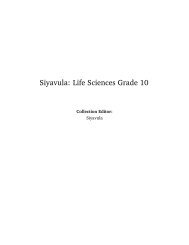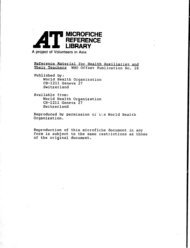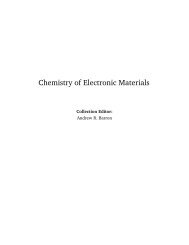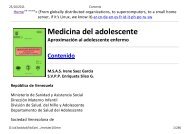Small Decentralized Hydropower Program National ... - Cd3wd.com
Small Decentralized Hydropower Program National ... - Cd3wd.com
Small Decentralized Hydropower Program National ... - Cd3wd.com
Create successful ePaper yourself
Turn your PDF publications into a flip-book with our unique Google optimized e-Paper software.
Con el advenimiento de la electricidad en 10s<br />
1880’s, y el principio de la evolution de la trans-<br />
mision de capacidades en 1890, se empezo a construir<br />
muchas plantas hidroelectricas de pequeiia escala,<br />
especialmente en el Oeste. Por ejemplo, en el estado<br />
de Utah donde vivo, casi cada villa a lo largo de las<br />
Montaiias Wasatch, desviaron las pequenas cor-<br />
rientes a lo largo de las paredes de 10s canones pro-<br />
fundos hacia las bocas de1 canon donde utilizaron la<br />
caida para generar electricidad que fue posterior-<br />
mente distribuida dentro de la pequena villa. Esto ha<br />
requerido un minima de tecnologfa, y ha sumi-<br />
nistrado energfa ekctrica para la iluminacion y para<br />
reemplazar la fuerza de la musculatura humana en<br />
ias pequefias industrias. A medida que aumentaba la<br />
poblacidn, estas instalaciones en pequena escala<br />
fueron absorbidas por 10s sistey:os mayores; algunas<br />
frzeron abandonadas por causa de 10s altos costos de<br />
opera&n para la pequena cantidad de energia pro-<br />
ducida. iu’o obstante, aigunos e&n en pleno proceso<br />
de rejuvenecimiento por causa de 10s elevados costos<br />
de1 petrbleo y otros recursos de energia.<br />
En el Noreste de 10s E&ados Unidos gr-adualmente<br />
se engancharon las ruedas de agua y las turbinas a<br />
ios generadores y miles de plantas generadoras en<br />
pequeiia escala contrilouyeron al rapido crecimiento<br />
de la industria. No obstante, hate <strong>com</strong>a 25 anos, la<br />
mayotia de las plantas pequenad fueron abandonadas<br />
debido al m&s bajo costo de la electricidad<br />
suministrada por sistemas mayores. Hoy dfa estamos<br />
en proceso de reconstruction y rejuvenecimiento de<br />
&as pequefias ceiiirales porque ia economia se ha<br />
vuelto favorable y porque la energfa acuatica<br />
representa una fuente de ener@a local, con-<br />
tinuamente renovable y de la cual se puede depender.<br />
Ventajas de la Hidroelectricidad<br />
Aunque la rantidad de energia producida y e!<br />
potential son impresionantes, la hidroelectricidad<br />
<strong>com</strong>a fuente de energia tiene otras ventajas impor-<br />
tames. Es un generador de energia que no se con-<br />
sume, que utiliza una fuente limpia, ccntinuamente<br />
renovable por la energfa de1 sol que crea y sostiene el<br />
ciclo hidrologico. Esenciaimente no ocusiona poluti6n<br />
y no desplaza calor. Es lrnaf7l,,cmtc! & GYMP#CI & La<br />
txai se JYK-CX% depenc&~, dentro de las limitaciones<br />
hidroldgicas de1 lugar La simplicidad relativa de la<br />
maquinaria hidraulica permite la disponibilidad<br />
instantanea de la energia cuando se la necesite.<br />
Coma no se requiere calor, el equip0 dura mucho<br />
tienipo y SlI Rlti!P.CiO:iZirr~ei~it~, cj mr0.<br />
La generation de hidroelectricidad requiere algun<br />
tipo de control acuatico, variando hasta el control<br />
technology and provided electric power for<br />
lighting and to replace the muscle power of<br />
people in small industries. As pOpUi=I?iOnS<br />
increased, these small scale instaliations were<br />
absorbed into the larger systems; some were<br />
abandoned because of high operattng costs for<br />
the small amount of power produced. However,<br />
some are now being rejuvenated because of the<br />
increasing costs of oil and other energy<br />
resources.<br />
In the Northeast part of the United States, the<br />
water wheels and turbines were gradually hooked<br />
to generators and thousands of small scale<br />
generating plants contributed to the rapid growth<br />
of industry. Ho wever, by abou? 2% years ago,<br />
most of the small plants had been abandoned<br />
because of less-cost electricity be<strong>com</strong>ing<br />
available from iarge systems. Today we are in the<br />
process of rebuilding and rejuvenating these<br />
small sites because the economics has be<strong>com</strong>e<br />
favorable and because water power represents a<br />
lOGa!, continually renewable and dependable<br />
source of energy.<br />
<strong>Hydropower</strong> Advantages<br />
While the amount of energy produced and the<br />
potential are impressive, hydropower as an<br />
energy source has other important advantages. It<br />
is a non-consumptive generator of energy, uti!iz-<br />
ing a clean resource, continually renewable by<br />
the energy of the sun which creates and sustains<br />
the hydrological CyCie. it is essentially non-<br />
polluting and no heat is released. It is a reliable<br />
energy source within the hydrological limitations<br />
of the site. The reiative simplicity of hydraulic<br />
machinery makes energy instantly available as<br />
needed. As no heat is involved, equipment has a<br />
long life and malfunctioning is rare.<br />
The generation of hydropower requires some<br />
type of water control, ranging up to full control of<br />
the discharge from a watershed, thus it is an<br />
imparJani part of the ,mMpurpnose uti?ka tion of<br />
water resources and reduces the potential of<br />
destruction from floods. Water out of control is<br />
mankind’s most destructive force. W’ith storage<br />
facilities, floodwaters are retained and better<br />
utilized for food production; for river regulation,<br />
improving navigation, fish and wildlife, and<br />
recreational potential; for municipal use and bet-<br />
ter control of wastewaters; and the destructive<br />
fom3 of fiood fiows, as weii as the energy of nor-<br />
mal flows! is harnessed to provide electrical<br />
energy for man’s use.<br />
14


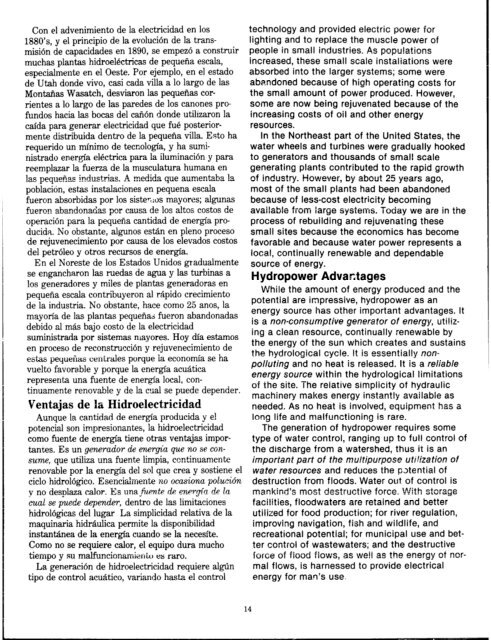

![Mum, int. [man] - Cd3wd.com](https://img.yumpu.com/51564724/1/190x134/mum-int-man-cd3wdcom.jpg?quality=85)
